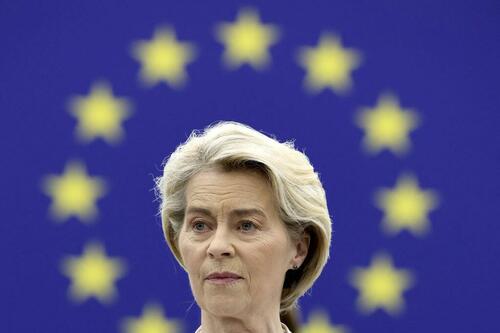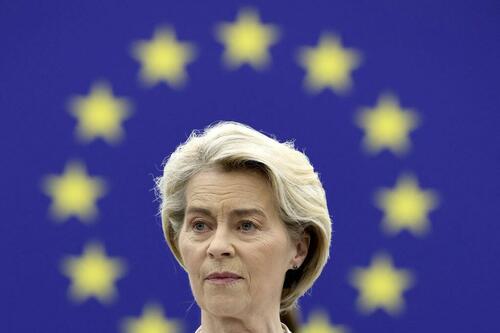Europe’s German Problem
Authored by Drieu Godefridi via The Gatestone Institute,
Today, Germany embraces the ideologies of “green energy” and a zero-carbon society — a society that no longer emits CO2. Germans seem serious about ideology; they seem serious about everything. Once they buy into an ideology, it might be hard to change their mind.
This is how Chancellor Angela Merkel came to power (2005-2021). Many forget that she did not emerge from the extreme green left, although judging by her record, one might think so. She came, in fact, from the CDU/CSU, Germany’s “center-right” party.
Merkel’s record is clear: 1) the demographic Islamization of Germany by opening its doors to a flood of migrants alien to German culture, and apparently with less than no interest in absorbing it; 2) the subordination of Germany’s energy to Russia, 3) the destruction of Germany’s nuclear heritage. If Merkel had have been an agent of the Russian regime — which trained her — she might have acted no differently.
With Merkel gone, Germany finds itself on an accelerating trajectory of impoverishment. According to the Süddeutsche Zeitung, the German Economy Ministry now projects a 0.2% GDP contraction for 2024, reversing its earlier prediction of 0.3% growth. Germany also faces industrial annihilation.
BASF, for instance, a flagship of Germany’s industrial sector since 1865, symbolizes the nation’s manufacturing strength. With nearly 400 production sites across 80 countries, its heart remains in Ludwigshafen, Germany, where it operates a vast complex with 200 plants and employs around 39,000 people. However, this hub has recently become a focal point for BASF’s challenges.
Over the past two years, the company has shut down one of its two ammonia units and idled several others at this location due to their lack of competitiveness, resulting in the loss of 2,500 jobs, explains Chemical and Engineering News. BASF also experienced a significant decline in 2023, with sales dropping by 21.1% and adjusted earnings plunging by 60.1%. Adding to these woes, BASF recently announced plans to cut costs by an additional $1.1 billion in Ludwigshafen, foreshadowing further job cuts.
As a result of this industrial disaster, the German establishment is confronting a democratic revolt by growing segments of its people, as shown by the recent regional elections in Thuringia, Saxony and Brandenburg, which saw the surge of the right-wing AfD party, which demands that Germany say goodbye to the green energy myths that are destroying its industry.
One might have hoped that the German right would learn a few lessons from the Merkel disaster. It has not. Federal polls and the recent regional elections seem to agree, predicting a disaster for the left, while the center-right CDU/CSU and the right-wing AfD are on the ascent.
While logic demands that the center-right and the right, which together have a large majority, govern — their policy convergences, whether on migration or energy, are numerous — the center-right has made clear its absolute refusal to govern with the AfD, in any way whatsoever.
This is forcing the CDU to consider governing tomorrow with… the Greens, Europe’s most radical extreme left (along with the Belgian and French environmentalists) — the party most opposed to the CDU on the issues of migration, the environment and prioritizing nuclear energy. The movement responsible for the destruction of Germany’s energy resources, and a direct accomplice of the Russian regime and under its patronage — the Greens — who signed and celebrated the dismantling of Germany’s nuclear power stations in the middle of the war in Ukraine after destruction of Nord Stream 2 gas pipeline; nuclear power stations that were still operational and could have continued to produce cheap energy for years.
Is the CDU actually preparing to close the borders with those who want to abolish borders; to send back unintegrable migrants despite the Greens’ opposition to deportation; to lower energy prices with the authors of the very policies that caused the prices to explode in the first place, and to counter Islamism with the help of its most dedicated allies?
This collaboration is being facilitated by a massive ideological convergence: both the CDU and the Greens believe in the necessity of the Energiewende (“energy transition”). The elimination of fossil fuels and nuclear power is to be replaced by the “renewable energies” — mainly wind and solar — which are intermittent, often unaffordable and of limited practical use. Wind and solar are massively impacted by weather conditions. Solar panels produce less on cloudy days, and wind turbines generate less during calm periods. This variability makes it difficult to ensure a consistent energy output.
The center-right CDU supports the market economy, the Atlantic alliance and German industry — but also adheres to environmentalists’ ideology. That view helps to explain why the European People’s Party (EPP), the largest political group in the European Parliament — in which the CDU is a member party — appointed Ursula von der Leyen as head of the European Commission. Under her leadership of the European Union, the economy is collapsing, industry is disappearing and Islamism is proliferating. Supposedly, all of that does not matter because Europeans have the Holy Grail: the “energy transition” to a “zero-carbon” Europe, and more regulations than all the other civilizations combined.
Unfortunately, that policy is an absolute myth. “Zero-carbon Europe”, a physical impossibility, will never happen. Even if it did, it would make no difference to the global explosion in CO2 emissions. Europe accounts for just 8% of global CO2 emissions. Even if Europe ceased to exist, it would make little difference to global CO2 emissions. They would continue to grow on all five continents. The destruction of European industry by the German right would have no effect on the climate — zero.
Today, with environmentalists touting the “zero-carbon society” and “100% renewable energy,” Germany has locked itself in myths hardly better than the Lebensraum of the previous century.
Today, as yesterday, these myths risk precipitating the ruin not only of Germany, but of the whole of Europe.
To get Germany and Europe out of this rut, would it not be more constructive for the CDU to consider governing with the AfD?
Tyler Durden
Mon, 11/04/2024 – 02:00


